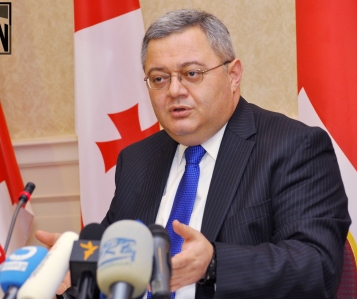
TBILISI, DFWatch–In a week the government in Georgia will decide whether to follow recommendations and proposals made by the non-parliamentary opposition and non-governmental organizations about amendments to the Election Code.
Speaker of Parliament Davit Usupashvili on Sunday met with opposition parties that are not represented in parliament to discuss the changes. The meeting took place at the Ministry of Justice.
Usupashvili said after the meeting that the opposition is more satisfied now than before. He said their main recommendations were about air time on TV during the election campaign, which under Georgian legislation is restricted to certain parties which didn’t get enough votes. They also had suggestions regarding party financing regulation. Usupashvili said parliament will try to take the remarks into account and a final decision will be made in about a week.
“We agreed that it is not possible to follow every demand by every party,” Usupashvili said, “but the main thing is that the process is open.”
Georgia’s Election Code is often criticized by groups who consider it designed so as to benefit the former ruling party, the National Movement, but after the change of government no major amendments have been made to the election legislation, even though the parties that are now in power criticized the law while they were in opposition.
A few months ago, an inter-faction group was created aimed at reaching a consensus about election issues, but the working process of the group has so far yielded no results.
The non-parliamentary opposition and NGOs prepared initiatives in six areas, but their main emphasis is on the election of mayors and so-called gamgebelis, which are heads of local governments.
Only the mayor of Tbilisi is elected directly, with threshold of 30 percent. This rule was introduced for the local government election in 2010. The current government increased the threshold to 40 percent for the twelve mayors in other cities, and 33 percent for election gamgebelis.
The opposition and NGOs claim that this barrier isn’t enough and want it to increase it to 50 percent.
Another issue is establishing multi-mandate majoritarian system in order to elect majoritarians through an equal number of voters.
A majoritarian is the term for a member of a popular assembly who is elected by the first past the post system. Under current legislation, each majoritarian in local government is elected by one community, in which there may be one or several villages. But communities in Georgia have highly varying number of villages. That is why the opposition thinks that majoritarians of local governments should be elected by equal number of votes.
The speaker of parliament said after the meeting that he is sure the new draft of amendments significantly improves several issues.
Levan Vepkhvadze from Christian Democrats says the government is ‘smart enough to bring the process out of the deadlock.’ He is optimistic about the results of Sunday’s meeting.
Mamuka Katsitadze from the New Rightists Party says in a week, white will become white and black will be white in the election legislation, and all questions will be answered.
Spokespersons for the Free Georgia Party say there was nothing new at Sunday’s meeting. The party issued a short statement claiming that members of parliament and Speaker Usupashvili do not have real authority but are just carrying out the orders of former Prime Minister Bidzina Ivanishvili. The party members say there is no point in organizing such meetings anymore.

